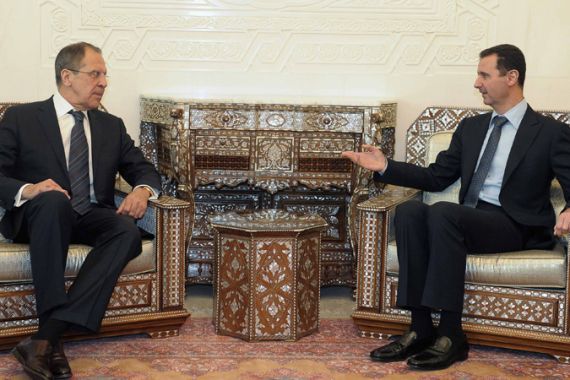Russia: Assad committed to ending violence
Foreign Minister Lavrov holds talks with Syrian president in Damascus as government forces continue to shell Homs.

Russia’s foreign minister has declared in Damascus that the Syrian government is committed to ending the country’s violence.
Sergei Lavrov made the remark after holding talks in the Syrian capital on Tuesday with President Bashar al-Assad.
However, in a sign that other countries were not so confident, Gulf Arab states joined France and Italy in withdrawing their ambassadors from Damascus.
The moves follow similar announcements from the US, which shut its embassy in Damascus, and Belgium and Britain, which recalled their ambassadors on Monday.
And in the central Syrian city of Homs, the military continued its assault on suspected opposition fighters. Witnesses said tanks and snipers began firing on residential areas from dawn for a fifth straight day.
Dozens of people have been killed in the ongoing military assault, according to activists.
Opposition groups say at least 6,000 people have died since the anti-Assad uprising began 11 months ago.
Lavrov’s visit to Damascus comes three days after Russia and China vetoed any UN-backed measures against the Assad government over its crackdown on protesters.
After holding what he called a “very useful meeting”, Lavrov described Assad as “fully committed” to ending the bloodshed.
“We [Russia] confirmed our readiness to act for a rapid solution to the crisis based on the plan put forward by the Arab League,” Lavrov said.
Large crowds
Russian news agencies quoted Lavrov as saying Syria also is ready to see an enlarged Arab League mission in the country.
Earlier in the day, Syrian state television showed large crowds greeting Lavrov as his convoy drove to Damascus from the airport.
Al Jazeera’s Rory Challands, reporting from Moscow, said that though expectations of any impact of the visit on the Assad government were low, Lavrov may be looking to engage with the Syrian opposition as well as the nation’s leadership.
In engaging with the opposition, Lavrov may be in search of moderates within the movement, he said.
|
Homs resident says residents of the Syrian city are ‘waiting to be killed’ [Al Jazeera] |
The presence of moderates within the opposition could be important, because what the Russians – who have had a long relationship of trade and arms sales with Syria – want to avoid is “a catastrophic collapse as we’ve seen in Libya”, our correspondent said.
Sergei Srokan, a Russian political analyst said, in finding the moderates in the opposition, Lavrov could show that “all those calling for President Assad to immediately step down don’t represent even the whole of the Syrian opposition”.
Both Russia and China have faced international condemnation after vetoing the UN resolution. Lavrov said before his visit that condemnation of the veto had verged on “hysteria”.
Russia has sought “the swiftest stabilisation of the situation in Syria on the basis of the swiftest implementation of democratic reforms whose time has come”, he said.
Al Jazeera’s Rula Amin, reporting from Beirut in neighbouring Lebanon, said the Russian logic seems to be that “any escalation on the government would lead Syria to more deteroriation, violence, and even a civil war”.
For this reason, she said, Assad’s grip on power “is a red line” for Russia, which has deep ties to Syria through arms sales and trading ports.
Nevertheless, the international divisions appeared to be only widening, with Italy recalling its ambassador from Syria for consultations on Tuesday. It said its embassy would remain open and “continue to follow with maximum attention developments in an extremely grave crisis”.
And announcing their decision to withdraw their ambassadors from Damascus “immediately”, the Gulf states said “the rising tide of killing and violence in Syria is showing no mercy towards women, children or the elderly”.
In a statement issued from Saudi Arabia, the six-nation Gulf Co-operation Council said the Syrian government ‘s actions could only be described as “ruthless massacres against unarmed people”.
Turkish initiative
In another Syria-related development, Turkey said it was preparing a new initiative to end the country’s bloodshed.
Recep Tayyip Erdogan, the Turkish prime minister, said on Tuesday that the initiative would involve countries that stood by the people and not the Assad government.
He described the Security Council resolution veto as “a fiasco for the civilised world”.
| Al Jazeera’s Nisreen El-Shamayleh reports from Amman where injured Syrians are seeking treatment |
“Those turning a blind eye to what’s going on and those not reacting the way they should will suffer the consequences as if they were fuelling the bloodshed themselves,” he said.
He criticised the military-led assault on Homs, comparing it to the 1982 Hama massacre in which 17,000 – 40,000 Syrians are said to have died.
“No one has been called to account for the Hama massacre – but you can be sure it will be asked for Homs sooner or later,” Erdogan said.
Despite the diplomatic pressure, there was no sign of a let-up in the military assault on Homs.
Speaking to Al Jazeera from the city on Tuesday, Abu Abdo Alhomsy, an activist of a revolutionary council, said: “We have a massive attack with bombs, tanks and machine guns … smoke could be seen rising above most of the city”.
The most intense bombing has been in the town of Bab Amr, he said.
“The situation is very bad. We don’t have any medical support to save these people,” Alhomsy said, noting also that there was a shortage of food in the city.
Syrian authorities, who have denied shooting at homes, said security forces killed “tens of terrorists” in Homs on Monday morning. An interior ministry statement said six members of the security forces were killed in the clashes.
Syrian state television has accused “armed gangs” of being behind the latest violence in Homs.